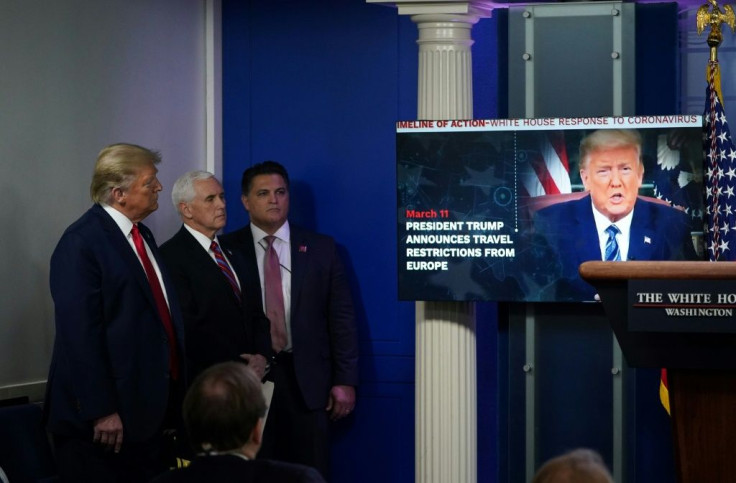US Coronavirus Briefing: Trump Lashes Out At Critics, Fauci Downplays Statement On Failed Response

KEY POINTS
- Trump escalated his war against the media by blasting them for criticizing his administration's COVID-19 response
- Trump's anger was apparently triggered by the explosive story published by The New York Times
- Dr. Fauci also clarified comments he made about the Trump administration's handling of the pandemic
President Donald Trump on Monday's White House coronavirus briefings blasted the "fake new media" for constantly criticizing his administration's COVID-19 response.
Some in the media noted this press briefing occurred 30 days after Trump made his now infamous statement, “I don’t take responsibility at all," for anything the federal government has done wrong during its COVID-19 response.
Trump set the tone for his anti-media coronavirus briefing by opening the proceedings with what some call a propaganda-style video featuring a compilation of TV news clips. The video intended to frame his efforts in curbing the virus in a positive way, while also showing the media is also guilty of downplaying the coronavirus danger from January to March
Aaron Rupar, the associate editor, politics and policy, at Vox.com tweeted: "This is so bonkers. Trump is now playing TV clips back to the media to make it seem as though they were complicit in downplaying the coronavirus."
This is so bonkers. Trump is now playing TV clips back to the media to make it seem as though they were complicit in downplaying the coronavirus. pic.twitter.com/lmzc4QDnzK
— Aaron Rupar (@atrupar) April 13, 2020
Rupar later wrote "Trump ultimately refused to admit to making a single mistake during the coronavirus response, even though the United States now has more total cases (over 585,000) and more deaths (more than 23,000) than any other country."
He was reacting to Trump's statement that "Everything we did was right," which he made after a lengthy tirade against the press.
Rupar later tweeted about the entire press briefing: "Trump's latest coronavirus press briefing began with an epic meltdown and ended with the ramblings of an aspiring dictator."
Trump also admitted that a team from his presidential office created the video.
“I’ve never seen a video like that played in this room,” asked ABC’s Jon Karl. “It looked a bit like a campaign ad. Who produced that for you?”
“That was done by a group in the office,” replied Trump.
Told by CBS' Paula Reid he didn't use the time he bought with the China travel ban to ramp-up testing or to prepare hospitals, Trump replied, "You are so disgraceful ... you know you're a fake."
Trump's anger was apparently triggered by the explosive story published by The New York Times Saturday. The story, “He Could Have Seen What Was Coming: Behind Trump’s Failure on the Virus,” details how Trump “was warned about the potential for a pandemic ... [but] internal divisions, lack of planning and his faith in his own instincts led to a halting response.”
The piece is backed-up by documents, email threads, and on-and-off-the-record quotes from Trump administration officials. His spate of public statements continually downplaying the virus and its threat to the U.S. people and economy were also recorded.
Another stunning outcome of the press briefing was the defense of Trump by Dr. Anthony Fauci, director of the National Institute of Allergy and Infectious Diseases (NIAID).
Dr. Fauci clarified comments he made Sunday to CNN about the Trump administration's handling of the pandemic. CNN called Dr. Fauci's willingness to fall on his own sword, "a striking show of reconciliation following a day of questions about his future on the White House task force."
Dr. Fauci explained he was responding to a "hypothetical question" during an appearance on CNN's "State of the Union" when he said more could have been done to save American lives. He alleged his response "was taken as a way that maybe somehow something was at fault here." He also said his remark about "pushback" inside the administration to some of his recommendations was a poor choice of words.
© Copyright IBTimes 2025. All rights reserved.





















